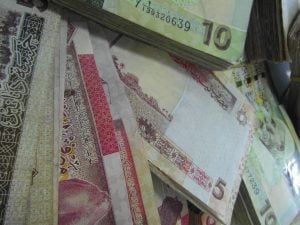By Sami Zaptia.

London, 7 March 2016:
The Central Bank of Libya (CBL) has denied claims that it has ordered LD 10 . . .[restrict]bn of new banknotes in order to solve the problem of cash shortages at banks.
In a statement released yesterday, the CBL said that it denies claims by the Administrative Control Authority (ACA) that it was printing new bank notes. It also denied that it was to reintroduce the old LD 50 banknotes in order to help solve the banknote shortage.
The CBL revealed that in fact it had disposed of the old issue LD 50 bank notes by incineration.
The CBL called the spreading of this news, which had originated from a fellow state institution (ACA) as an ‘’organized campaign against the CBL’’. It warned that it will take legal action against all those who publish inaccurate information on it or its staff.
The CBL had come in for criticism from leading business leaders for its intention of pumping money into the economy as a counter-productive and inflationary move.
The denial by the CBL comes on the back of the Tripoli-based Administrative Control Authority (ACA) announcing on 22 February that it had carried out ‘‘an investigation’’ into ‘’the causes of the shortage of certain banknotes’’ at Libyan banks and that remedies had been ‘’put in place to solve the problem’’.
The Libyan ACA is the body concerned with the oversight of administrative and state employee corruption or maladministration. Its sister body the Audit Bureau is concerned with the oversight of financial matters.
The ACA had said that its investigations have revealed that the banknote shortage was as a result of ‘‘the decline in the flow of revenues to banks’’.
‘‘Work is underway’’, the ACA had explained ‘‘to solve the cause of the shortage through relevant sectors’’ and that the first shipment of LD 10 bn of LD 10 and LD 5 banknotes had already been received.
This latest statement by the CBL seems to refute the ACA’s claim of the ordering of new banknotes and puts the two Tripoli-based state institutions located in relative proximity to each other at odds with one-another. [/restrict]









